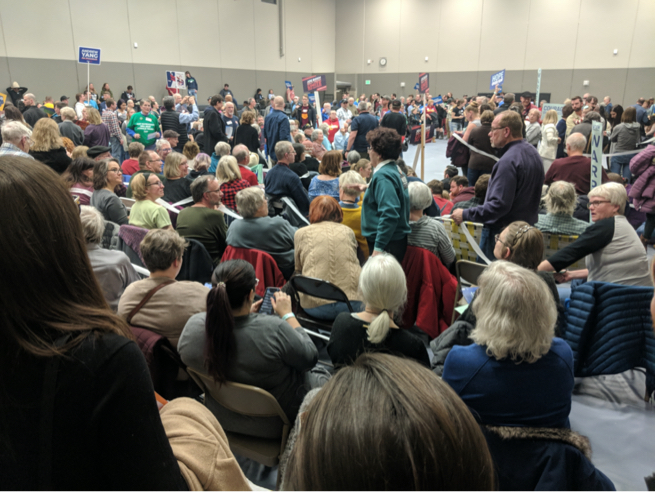Self-Administered vs. Managed Elections: Which One is Right for You?
If you have an election deadline approaching, you need a voting solution that’s easy, effective, and one that caters to the needs of both you and...

On February 3, 2020, the Iowa Democratic Caucus provided a contentious and convoluted series of events that delayed the results for the better part of a week. A voting app, built by Shadow Inc., was at the center of the discussion.
In case you missed it, here’s a short backstory and quick recap of the main events:
Shadow Inc. (now rebranded as Bluelink), a Washington, D.C.-based for-profit political technology company, was contracted by the Iowa Democratic Party to build and roll out an app that would make it quicker and easier for caucus members to send their results to be tabulated and reported on.
According to the Verge, Shadow’s mission is to “build political power for the progressive movement by developing affordable and easy-to-use tools for teams and budgets of any size”.
The for-profit company was initially formed by two former software engineers working for the Clinton campaign in 2016. It was acquired in 2019 by Acronym, a non-profit digital media corporation that commonly aligns with Democratic political campaigns and left-leaning causes and organizations.
Shadow's flagship product is Lightrail, a data integration and automation tool to help political campaigns track things like donations, volunteer lists, voter contact lists, and text messaging tools.
The company was contracted by the Iowa Democratic Party to develop the IowaReporterApp to collect and count the results of the caucuses, for the estimated cost of $60,000 - an unusually low rate, considering the scope of the project and required work involved.
It should be noted that this actually wasn’t the first time that state political parties have tried using a voting app to make the tabulation process more efficient. However, the use of this particular company and app were kept secret from the public for the stated reason of additional security.
Further, reports from the New York Times and ProPublica found that the software version used on the day of the caucus had been inadequately tested and failed several security audits.
The lack of transparency communication from Shadow, Inc. ultimately prompted widespread criticism and confusion from all sides and left many to question the validity of the results of the race.
The sending of results malfunctioned due to technical problems with the app, which had begun development just two months prior to the caucus date.
Although the app collected the data correctly, it was confirmed that there were inconsistencies in how the app reported the results. This clearly caused significant discord and skepticism among the Iowans involved.
Finally, 24 days after the initial count, a recount was completed. The new results were so close that AP News declined to declare a winner of the contest.
Ultimately, the 2020 Caucus app development and rollout drew widespread concern about whether the risks of using newer voting technologies outweigh the benefits of older, more trusted systems.
To us, it also shines the light on the fact that there are right and wrong software development practices.
Since this event affected so many people, we think it’s important to make sense of what happened and begin a conversation about what is and isn’t acceptable when it comes to using technology to decide major events, such as a primary or general election.
Our desire to leverage technology to do more for us isn’t going away. Neither are collaborative decisions that directly affect massive groups of people.
While it seems like our election system and processes will recover from this calamity, we believe the focus should be on preventing something like this from happening in the future.
It’s that throwing away the helpful technology along with the bad development and rollout practices is the wrong move.
It’s that we should be upset when corners are cut, because of how often shoddy work leads to massive issues down the line.
It’s that, while a tall order, we should demand that the technology is built and rolled out according to standards of excellence - especially when these standards are well-known and widely-accepted among those who practice them.
All of this was an entirely preventable scenario.
Yes, it would’ve taken more time and resources. But we wouldn’t need a costly recount. And we’d all have more faith in our key election events.
Here are the problems with the app development and rollout, along with a perspective on how things should have been improved.
There has been limited information that has come out about the technical testing component, so we won’t spend time speculating.
And actually in Shadow’s defense, the app actually collected the data correctly. The flaw was in how it reported on that data, hence the recount.
People need to know how to use the app correctly and feel confident doing so. This can’t be understated.
No matter how intuitive a given app is, users will have questions. Especially during a high profile arrangement like a voting event. Here are a few examples:
All of these are entirely predictable, easy to answer, and were not shared with the Caucus administrators until the last minute.
Further, there should have been time allotted for the software developers to go back and make these updates based on these suggestions.
This clearly wasn’t done and that’s probably the #1 reason why things panned out the way they did.
Two months...
To understand what the client is looking for and have both parties agree.
To technically develop an app based on these specifications.
To gather feedback in a testing environment and integrate that feedback.
To train users on how to use the software.
To officially roll it out and move forward.
While not impossible in theory, it’s definitely not possible to get that for a price tag of $60k from an experienced software firm.
More often than not, it simply postpones them.
Obviously there’s the reality that time, money, and other resources are limited.
As mentioned above, a more thorough testing process and an elongated timeframe are two essentials that wouldn’t have brought up the cost that much. Taking an active approach to preparation.
“Federal Election Commission records show that the IDP paid Shadow just $63,000 for its work on the app.” - Vox | Recode
As far as cost goes, any reasonable estimate of what the app should’ve cost is well above the $60k mark that was paid. $1.5 - 2M is a much more realistic price.
There are some things that shouldn’t be slighted without taking on an excessive amount of risk and the amount you pay for technologists is one of them.
A software firm, who bills themselves as being “affordable” might not be the right fit for a major nationwide event.
As a general rule, it’s preferable to secure more resources and get it done right the first time.
Or to pause on the new implementation until you can afford it.
Shadow Inc. makes a concerted effort to sell to a specific political group.

A screenshot of Shadow's mission statement on their website, prior to rebranding as Bluelink
Sure, it may make sense to hire a left or right-leaning advertising firm to fight for your left or right-leaning candidate, since they may know the nuances of their candidate and voters better.
But why on earth would you hire based on political ideology as opposed to, say, trusted software expertise?
The app was not launched anywhere close to where it needed to be, in terms of best practices.
It should have been properly submitted to the app stores.
Instead, it was launched and rolled out in a testing environment made for apps that are not yet finalized.

The email Caucus administrators received, instructing them to download the test version of the app
While this isn’t in and of itself a total dealbreaker, it does make the app users have to jump through login hoops that they weren’t trained for (e.g. downloading the testing environment app).
It’s also just, again, bad software development practice that a more trustworthy firm would not have engaged in.
First, we’re no stranger to high-profile events.
From mainstream sports, to Hollywood, to major universities - we don’t shy away from events that will be in the public spotlight.
We have found that political communities, for reasons we won’t speculate on, are more often than not too disorganized for how quickly they want work done.
Not that anything is wrong with that, per se. It’s just that, given the circumstances, it’s highly likely that the work they need done would be unsuccessful. Primarily due to the need for organization and time for thorough testing.
We’re in the business of doing things right. Doing them well. And making predictable success happen, time and time again.
Based on what was allowed to happen with the Iowa Caucus, and combined with our experiences, we’re regretful to say that politics isn’t quite there yet.
Based on all the events we run for organizations, we know that the best voting events are the ones where the organization and the people within it are able to trust that their votes were carried out fairly.
If we were to apply this in the political sphere, even if the technology worked flawlessly, the lack of trust would be the real killer.
How do we, in general, convince people to give us a shot?
Our past history of successful voting events. Personal references from big-name organizations. Our high client retention rates. Our transparency about the services we offer. Our proactive willingness to turn down potential clients if they aren’t a good fit.
Those are some of the ways we convey that we can actually do the job to potential and existing customers and organizations.
No doubt that’s more than the technology vendor in question had.
However, we’re not quite sure that’s sufficient for convincing the entire country at this point in time.
If there’s no trust - amongst the event organizers and the voters - your vote or election (or caucus) is destined to fail.
So, in the meantime, we’ll stick to our path providing voting software and services to a wide array of groups without diving into the political sphere.

If you have an election deadline approaching, you need a voting solution that’s easy, effective, and one that caters to the needs of both you and...

Casting a ballot or taking a vote in-person can be a powerful experience for your voters. Though it is a simple gesture, it’s a tangible...

Teaching students about the voting process and the value of elections not only encourages them to make their voices heard but also inspires them to...